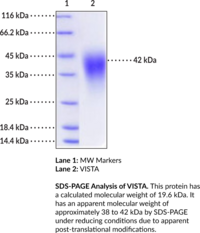Territorial Availability: Available through Bertin Technologies only in France
- Correlated keywords
- HEK 293 GL 261 Phe 33 SISP 1 alpha PD1H B7 H5 C10orf54 GI 24 PP 2135 SH 2 CD 4 Fox P 3
- Product Overview:
V-Domain immunoglobulin (Ig) suppressor of T cell activation (VISTA) is a type I transmembrane receptor and negative checkpoint regulator encoded by VSIR in humans.{54210} It is composed of an N-terminal extracellular domain, containing a signaling sequence, Ig V domain, and stalk region, a transmembrane domain, and a cytoplasmic tail that contains a conserved Src homology 2 (SH2) binding motif. It is expressed in myeloid cells, monocytes, macrophages, dendritic cells, naïve CD4+ and FoxP3+ regulatory T cells, and natural killer (NK) cells.{54209} VISTA arrests cell division and suppresses early T cell receptor activation when expressed on CD4+ T cells, and suppresses antigen-specific T cell activation when expressed on antigen presenting cells.{54211} Vsir-/- mice are resistant to tumor induction compared with wild-type mice in a GL261 mouse glioma model.{54209,54211} Monocyte levels of VISTA are increased in patients with HIV compared with healthy controls.{54212} VSIR expression is increased in the circulating immune cells of patients with systemic lupus erythematosus (SLE) and in skin biopsies from patients with discoid lupus erythematosus (DLE). Cayman’s VISTA (human, recombinant) protein consists of 173 amino acids, has a calculated molecular mass of 19.6 kDa, and a predicted N-terminus of Phe33 after signal peptide cleavage. By SDS-PAGE, under reducing conditions, the molecular mass of the protein is 38-42 kDa due to apparent post-translational modifications.
Cayman Chemical’s mission is to help make research possible by supplying scientists worldwide with the basic research tools necessary for advancing human and animal health. Our utmost commitment to healthcare researchers is to offer the highest quality products with an affordable pricing policy.
Our scientists are experts in the synthesis, purification, and characterization of biochemicals ranging from small drug-like heterocycles to complex biolipids, fatty acids, and many others. We are also highly skilled in all aspects of assay and antibody development, protein expression, crystallization, and structure determination.
Over the past thirty years, Cayman developed a deep knowledge base in lipid biochemistry, including research involving the arachidonic acid cascade, inositol phosphates, and cannabinoids. This knowledge enabled the production of reagents of exceptional quality for cancer, oxidative injury, epigenetics, neuroscience, inflammation, metabolism, and many additional lines of research.
Our organic and analytical chemists specialize in the rapid development of manufacturing processes and analytical methods to carry out clinical and commercial GMP-API production. Pre-clinical drug discovery efforts are currently underway in the areas of bone restoration and repair, muscular dystrophy, oncology, and inflammation. A separate group of Ph.D.-level scientists are dedicated to offering Hit-to-Lead Discovery and Profiling Services for epigenetic targets. Our knowledgeable chemists can be contracted to perform complete sample analysis for analytes measured by the majority of our assays. We also offer a wide range of analytical services using LC-MS/MS, HPLC, GC, and many other techniques.
Accreditations
ISO/IEC 17025:2005
ISO Guide 34:2009
Cayman is a leader in the field of emerging drugs of abuse, providing high-purity Schedule I-V Controlled Substances to federally-licensed laboratories and qualified academic research institutions for forensic analyses. We are certified by ACLASS Accreditation Services with dual accreditation to ISO/IEC 17025:2005 and ISO Guide 34:2009.





